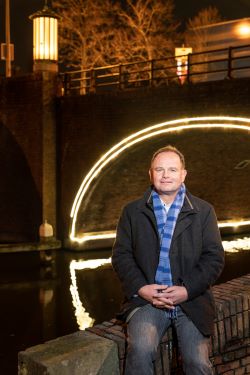'Consolation is being able to give meaning to loss'
Being able to give meaning to loss – that is what consolation is. Christoph Jedan, Professor of Ethics and Comparative Philosophy of Religion, examined the consolation literature of theologians and of philosophers from classical antiquity. He developed a consolation model with five elements, one of which is ‘resilience’.

Christoph Jedan is an enthusiastic man. While talking about his research theme, ‘consolation’, he mentions a book by Dutch-American theologian Henri Nouwen and immediately runs up the stairs in his house to fetch a copy. When he comes back down he puts a copy of A Letter of Consolation on the table – the English edition of the letter Nouwen wrote to his father in 1982 after the death of his father’s wife. ‘Henri Nouwen was on the other side of the world, in the United States’, explains Jedan. ‘They only saw each other occasionally. His father was a successful corporate lawyer, but the point is that after the loss of his wife the father was able to embark on new paths and to take on care tasks. Nouwen praises him for this: “you have dealt with the loss very well, you have taken your wife’s role in the family on yourself”.’
Resilience
So that is the element of ‘resilience’. As Professor of Ethics and Comparative Philosophy of Religion, Jedan devised a model of consolation with five axes, of which resilience is one. After careful reading of consolatory letters from classical antiquity – by philosophers such as Seneca, Cicero, and Plutarch – he noticed that five elements always recur in relation to giving meaning to loss. ‘That is what consolation is: being able to give meaning to loss.’
As we have seen, one axis is talking about resilience. The second axis is ‘constructive grieving’. ‘ Not all grieving is constructive’, says Jedan. ‘You can also completely destroy yourself. You see that with author Connie Palmen in Logboek van een onbarmhartig jaar [Logbook of a Merciless Year], written after the death of her husband Hans van Mierlo. She tries to numb her grief with alcohol. That is sure to strike a chord with many people, but it is not constructive. Someone who wants to console another person tries to show ways in which that person can deal with their loss without harming themselves so much.’
Death is part of life
The third axis is the ‘autobiographical element’: drawing attention to the beauty of the life of the person who has died. ‘Look at the richness of that life, look at how good the person was for others’, says Jedan. The fourth is the ‘philosophical significance’. ‘That means showing that in the grander scheme of things death is part of life. Take for example an ancient philosopher who says: what would happen if we lived forever? It’s about the endlessness of being immortal. In antiquity, the Epicureans said, “imagine if we were to live forever – nature also needs material to work with!” Now people might say: death brings life into focus. You know your time is limited. You have to commit yourself to something. That is an idea you see among the existentialists of the early twentieth century: death as the motivation for an authentic life. There are also ideas such as: the dead are with God, everything is fine in the afterlife. These are all worldviews that show that death has a legitimate role.’
Connection
Finally, there is the fifth axis: ‘connection’. ‘That you stress: as a grieving person, I am connected to a community. But the deceased person is also connected, for instance with multiple generations. Take the famous letter by Seneca, Ad Marciam, which he wrote around 40-45 CE. He is writing that letter to the noble lady Marcia who has lost her favourite son. She is broken by his death and hasn’t left her house for three years. Seneca stresses how much she is part of her family. “Listen”, says Seneca, “your son has left children behind. You must be there for them. Your son lives on in his children”.’
Jedan found ‘consolation’ as a philosophical theme when years ago interest in ancient philosophy began to flourish again. The main focus was on the ancient ‘art of living’. Jedan observed that little attention was paid to the views of the ancient philosophers on loss and death. In his youth, he himself had worked as a gravedigger and undertaker in Germany. Wearing a tall top hat and cotton gloves, Jedan had often held one of the ropes with which a coffin was lowered into the ground. He remembers the ritual of taking off your gloves and leaving them behind on the coffin.

Modern ways of coping with loss
This was why he chose the theme of consolation. He says that his consolation model also enables him to study the modern, often secular ways of coping with loss. Take the custom of talking to the deceased person in the present tense during funerals. In a veiled way, this also contains an element of continuity and even eternity. Or take a look at the grave of British homosexual author Oscar Wilde at the Père Lachaise cemetery in Paris. The tomb is surrounded by a glass screen. ‘Visitors try to find a way to place a memento behind that high glass barrier. For instance, you might see a note saying, “You, Oscar, have been a huge support to me. Without you, I and the gay community around me would never have had the courage to come out of the closet and to live as who we are.” In this we see that element of the value that someone’s life has had. At the same time, the community is highlighted: you helped create a community that transcends your death by far. We have become stronger through that.’
Trauerarbeit
If you read consolation texts by authors such as Seneca and Cicero you see what people’s emotional needs are. In his inaugural lecture in 2017, Jedan even said, ‘Politicians and policymakers should try reading consolation literature to understand better at how many levels people are vulnerable. If you do that, you realize that people who have suffered a severe loss need more than a technocratic answer. Think of the child benefits scandal: the fact that a cabinet resigns because of that scandal cannot provide the consolation that those affected need at an emotional level.’
Sigmund Freud already spoke about ‘Trauerarbeit’ [grief work]. Jedan has adopted this term, because grieving is in fact a labour-intensive process. However individual and secular our society has become, Christoph Jedan thinks we must not forget that: in times of loss we need community, and also thesense of a continuity that transcends the present.
Christoph Jedan (Germany, 1970) studied philosophy, classics, and theology. Since 2003, he has been working in the Netherlands at the Faculty of Theology and Religious Studies of the University of Groningen. He is Professor of Ethics and Comparative Philosophy of Religion. Recently, with an international team, he completed a study of the funerary customs of minorities in six European countries. In 2017, he said in his inaugural lecture Een voltooid leven – Over troost en de intelligentie van religie [A Completed life: on Consolation and the Intelligence of Religion], ‘(…) religion makes us think. Religions formulate intuitions, they formulate ways of thinking that are illuminating and inspiring, particularly if you are not an adherent of the religion in question.’
More information
This article has been published in our alumni magazine Broerstraat 5.
Text: Jurgen Tiekstra, Photos: Reyer Boxem
More news
-
06 January 2026
Connecting with history
-
08 December 2025
Citizen participation essential for a sustainable energy future
-
02 December 2025
Trust in science requires integrity in communication
